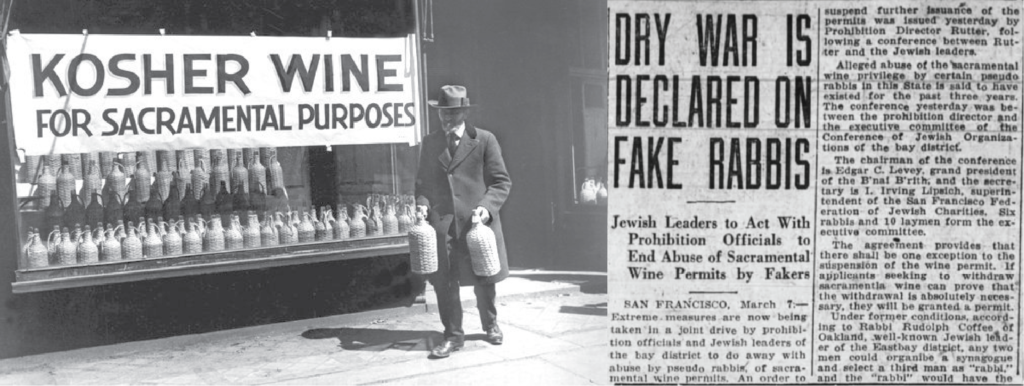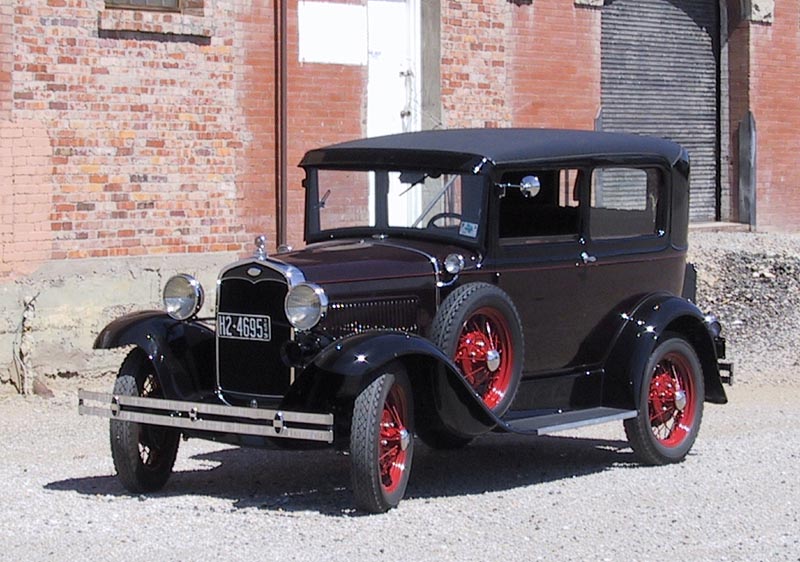The Volstead Act. During Prohibition, the federal government had a very tough law prohibiting the sale of alcoholic beverages. However, there were a few exceptions in this law. For one thing, the government had to allow the sale of sacramental wine to Roman Catholics and Jews. This provision didn’t affect the amount of wine purchased by Catholic churches, but sales of sacramental wine by rabbis exploded. Because of the way the Catholic church is organized, anyone can’t just say: “I am a Roman Catholic priest”; however, anyone can say: “I am a rabbi.” Unlike the Catholic church, there is no supreme authority, like the Pope, in Judaism. In addition, Catholics consume sacramental wine in churches, whereas Jews consume sacramental wine at home – unsupervised. Under the Volstead Act, Jews were entitled to buy 10 gallons of wine a year for “private religious observance.” Almost as soon as the law went into effect, huge numbers of Americans suddenly discovered that they were Jews – something that they had not known before Prohibition, and that they were pious Jews as well, and that they needed sacramental wine, a lot of sacramental wine. As soon as Prohibition ended, those same people just as suddenly discovered that they weren’t Jewish after all, and sales of kosher wine returned to their pre-Prohibition levels. In 1924, Rabbi Rudolph Coffee of Oakland’s Temple Sinai complained that the number of families in Alameda claiming to be Jewish was 50 in the 1920 U.S. Census, but in 1924, over 500 families in Alameda claimed to be Jewish. Rabbi Coffee argued that the number of Jews in Alameda could not possibly have increased by 1,000% in just 4 years.

Wine Rabbis. Anyone with a rabbinical license could issue sacramental wine permits, and getting a rabbinical license was easy. In some states, it only required that a person get 10 signatures on an application form, and those signatures could come from anyone, including the applicant’s friends and relatives. As a result, the number of licensed rabbis in the United States increased tremendously during Prohibition. Most of these “wine rabbis”, as they were known, were not Jews. Many had suspiciously unJewish sounding names including Rabbis Sean and Patrick O’Connor of Boston (brothers), Rabbi Luis Mendoza of Tucson, and Rabbi Akira Matsumoto of Los Angeles. In 1922, the Jewish World newspaper reported that a Greek junk dealer in Denver made $100,000 selling kosher wine and wine permits using his rabbinical license. That’s almost $2 million in today’s money. In addition to selling wine permits, licensed rabbis could also sell sacramental wine to people directly, and they could issue sacramental wine permits to restaurants and social clubs. Of course, they charged a fee for this service, typically $200 to $500, a lot of money in the 1920s. Because it was legal to buy sacramental wine, it was much cheaper to drink wine than hard liquor or beer during Prohibition. As a result, sales of wine skyrocketed in the United States. In 1919, the year before Prohibition went into effect, California farmers used 100,000 acres of land to grow wine grapes. By 1924, that grew to 680,000 acres.
The Pseudo Rabbi Squad. The Federal Bureau of Prohibition had a ‘Pseudo-Rabbi Squad’ which tried to put a stop to this, but whenever they put a fake rabbi out of business someplace, new ones popped up elsewhere. Jewish organizations also tried to put the pseudo-rabbis out of business, fearing that they would stir up antiSemitism, which they did. The Klux Klan was at its peak of power in the 1920s. They strongly supported Prohibition and blamed bootlegging on Jews and Roman Catholic Italian and Irish gangsters. All efforts to put the pseudo-rabbis out of business failed. There was just too much money being made selling kosher wine, plus the public did not support the law, and too many policemen and politicians were taking bribes from bootleggers. The pseudo-rabbis only went out of business when Prohibition was repealed. Below is an article from the Oakland Tribune from this period.
I had assumed that most Jews knew about the story, but I was wrong. While everybody knows about the big-shot gangsters who controlled the sale of hard liquor and beer during Prohibition, people like Al Capone, Dutch Schultz, and Lucky Luciano; almost nobody knows about the pseudo-rabbis. My father and his brother Sol sold bootleg liquor during Prohibition. Neither one of them claimed to be rabbis. Even though they were small time operators, my father made enough money selling bootleg booze to buy a ‘Model A’ Ford. He was one of the very few people in his family to own a car during the Great Depression. In 1933, Prohibition was repealed, and my father and his brother had to get real jobs, jobs that paid a lot less than what they had been making selling whiskey to their friends and neighbors. My father told me that Prohibition was the stupidest thing the United States did in his lifetime.

